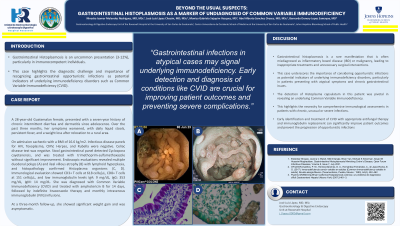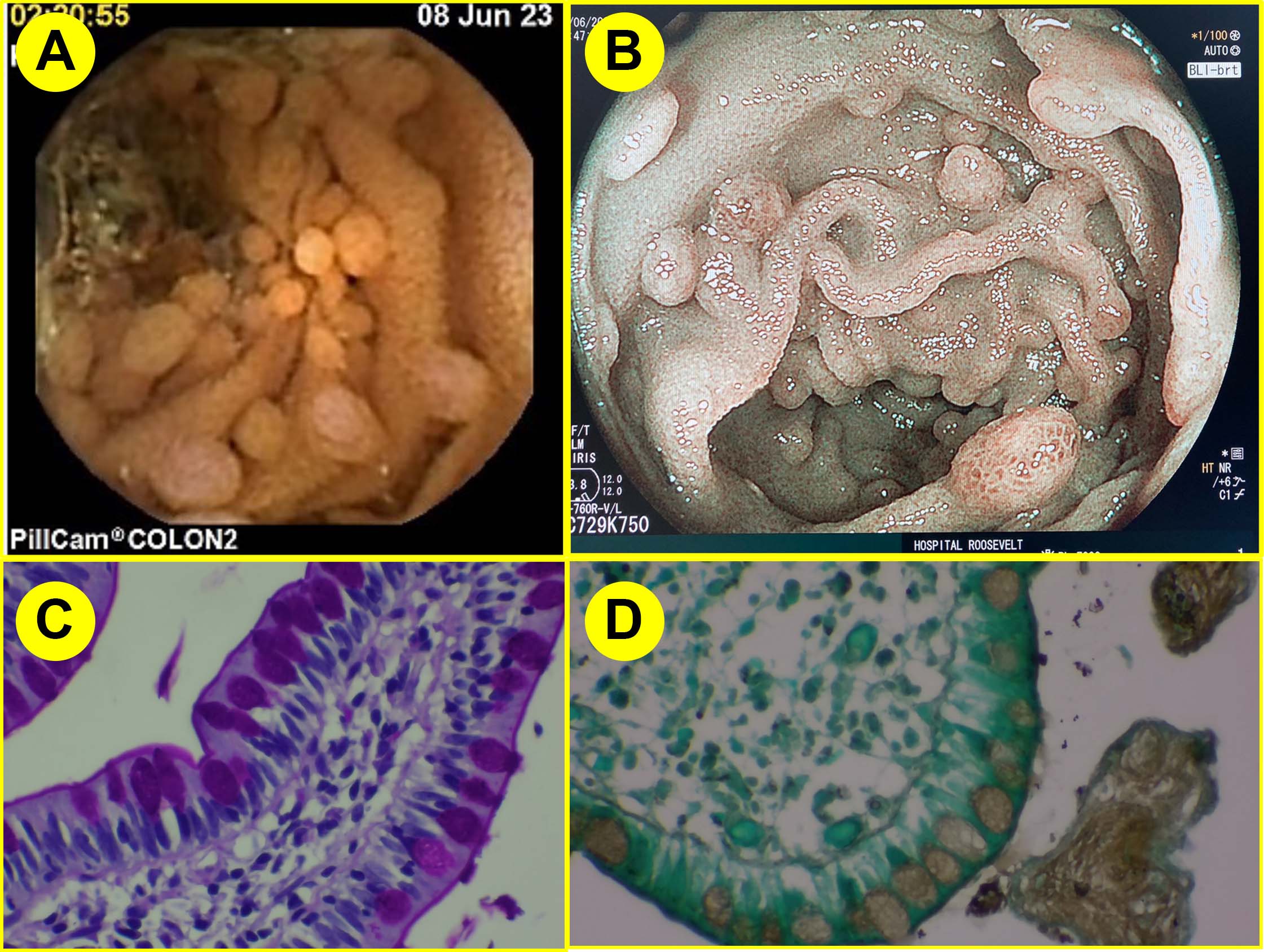Monday Poster Session
Category: Small Intestine
P3229 - Beyond the Usual Suspects: Gastrointestinal Histoplasmosis as a Marker of Undiagnosed of Common Variable Immunodeficiency
Monday, October 28, 2024
10:30 AM - 4:00 PM ET
Location: Exhibit Hall E

Has Audio
- BL
Bernardo Donery Lopez Samayoa, MD
Johns Hopkins Bloomberg School of Public Health
Baltimore, MD
Presenting Author(s)
Award: Presidential Poster Award
Ninoska Isamar Melendez Rodriguez, MD, MSc1, José Luis López Chacón, MD, MSc2, Monica Gabriela Sajquim Vasquez, MS3, Abel Alberto Sanchez Orozco, MD, MSc4, Bernardo Donery Lopez Samayoa, MD5
1Gastroenterology & Digestive Endoscopy Unit of the Roosevelt Hospital at the University of San Carlos de Guatemala, Guatemala, Quetzaltenango, Guatemala; 2Gastroenterology & Digestive Endoscopy Unit of the Roosevelt Hospital at the University of San Carlos de Guatemala, Guatemala, Zacapa, Guatemala; 3Centro Universitario de Occidente School of Medicine at the University of San Carlos de Guatemala, Quetzaltenango, Quetzaltenango, Guatemala; 4Gastroenterology & Digestive Endoscopy Unit of the Roosevelt Hospital at the University of San Carlos de Guatemala, Guatemala City, San Marcos, Guatemala; 5Johns Hopkins Bloomberg School of Public Health, Baltimore, MD
Introduction: Gastrointestinal Histoplasmosis is an uncommon presentation (3-12%), particularly in immunocompetent individuals. This case highlights the diagnostic challenge and importance of recognizing gastrointestinal opportunistic infections as potential indicators of underlying immunodeficiency disorders such as Common Variable Immunodeficiency (CVID).
Case Description/Methods: A 28-year-old Guatemalan female, presented with a seven-year history of chronic intermittent diarrhea and dermatitis since adolescence. Over the past three months, her symptoms worsened, with daily liquid stools, persistent fever, and a weight loss after relocation to a rural area.
On admission cachectic with a BMI of 16.6 kg/m². Infectious disease panels for HIV, Toxoplasma, CMV, Herpes, and Rubella were negative. Celiac disease test was negative. Stool gastrointestinal panel detected Cyclospora cayetanensis, and was treated with trimethoprim-sulfamethoxazole without significant improvement. Endoscopic evaluations revealed multiple duodenal polyps (A) and ileal villous atrophy (B) with lymphoid hyperplasia, and histopathology confirmed Histoplasma organisms (C, D). Immunological evaluation showed CD3+ T cells at 618 cells/µL, CD8+ T cells at 151 cells/µL, and low immunoglobulin levels IgA: 9 mg/dL, IgG: 353 mg/dL, IgM: 14 mg/dL. She was diagnosed with Common Variable Immunodeficiency (CVID) and treated with amphotericin B for 14 days, followed by indefinite itraconazole therapy and monthly intravenous immunoglobulin (IVIG) infusions. At a three-month follow-up, she showed significant weight gain and was asymptomatic.
Discussion: Gastrointestinal histoplasmosis is a rare manifestation that is often misdiagnosed as inflammatory bowel disease (IBD) or malignancy, leading to inappropriate treatments and unnecessary surgical interventions. This case underscores the importance of considering opportunistic infections as potential indicators of underlying immunodeficiency disorders, particularly in patients presenting with atypical symptoms and chronic gastrointestinal issues. The detection of Histoplasma capsulatum in this patient was pivotal in revealing an underlying Common Variable Immunodeficiency.
This highlights the necessity for comprehensive immunological assessments in patients with chronic, unusual or severe infections. Early identification and treatment of CVID with appropriate antifungal therapy and immunoglobulin replacement can significantly improve patient outcomes and prevent the progression of opportunistic infections.

Disclosures:
Ninoska Isamar Melendez Rodriguez, MD, MSc1, José Luis López Chacón, MD, MSc2, Monica Gabriela Sajquim Vasquez, MS3, Abel Alberto Sanchez Orozco, MD, MSc4, Bernardo Donery Lopez Samayoa, MD5. P3229 - Beyond the Usual Suspects: Gastrointestinal Histoplasmosis as a Marker of Undiagnosed of Common Variable Immunodeficiency, ACG 2024 Annual Scientific Meeting Abstracts. Philadelphia, PA: American College of Gastroenterology.
Ninoska Isamar Melendez Rodriguez, MD, MSc1, José Luis López Chacón, MD, MSc2, Monica Gabriela Sajquim Vasquez, MS3, Abel Alberto Sanchez Orozco, MD, MSc4, Bernardo Donery Lopez Samayoa, MD5
1Gastroenterology & Digestive Endoscopy Unit of the Roosevelt Hospital at the University of San Carlos de Guatemala, Guatemala, Quetzaltenango, Guatemala; 2Gastroenterology & Digestive Endoscopy Unit of the Roosevelt Hospital at the University of San Carlos de Guatemala, Guatemala, Zacapa, Guatemala; 3Centro Universitario de Occidente School of Medicine at the University of San Carlos de Guatemala, Quetzaltenango, Quetzaltenango, Guatemala; 4Gastroenterology & Digestive Endoscopy Unit of the Roosevelt Hospital at the University of San Carlos de Guatemala, Guatemala City, San Marcos, Guatemala; 5Johns Hopkins Bloomberg School of Public Health, Baltimore, MD
Introduction: Gastrointestinal Histoplasmosis is an uncommon presentation (3-12%), particularly in immunocompetent individuals. This case highlights the diagnostic challenge and importance of recognizing gastrointestinal opportunistic infections as potential indicators of underlying immunodeficiency disorders such as Common Variable Immunodeficiency (CVID).
Case Description/Methods: A 28-year-old Guatemalan female, presented with a seven-year history of chronic intermittent diarrhea and dermatitis since adolescence. Over the past three months, her symptoms worsened, with daily liquid stools, persistent fever, and a weight loss after relocation to a rural area.
On admission cachectic with a BMI of 16.6 kg/m². Infectious disease panels for HIV, Toxoplasma, CMV, Herpes, and Rubella were negative. Celiac disease test was negative. Stool gastrointestinal panel detected Cyclospora cayetanensis, and was treated with trimethoprim-sulfamethoxazole without significant improvement. Endoscopic evaluations revealed multiple duodenal polyps (A) and ileal villous atrophy (B) with lymphoid hyperplasia, and histopathology confirmed Histoplasma organisms (C, D). Immunological evaluation showed CD3+ T cells at 618 cells/µL, CD8+ T cells at 151 cells/µL, and low immunoglobulin levels IgA: 9 mg/dL, IgG: 353 mg/dL, IgM: 14 mg/dL. She was diagnosed with Common Variable Immunodeficiency (CVID) and treated with amphotericin B for 14 days, followed by indefinite itraconazole therapy and monthly intravenous immunoglobulin (IVIG) infusions. At a three-month follow-up, she showed significant weight gain and was asymptomatic.
Discussion: Gastrointestinal histoplasmosis is a rare manifestation that is often misdiagnosed as inflammatory bowel disease (IBD) or malignancy, leading to inappropriate treatments and unnecessary surgical interventions. This case underscores the importance of considering opportunistic infections as potential indicators of underlying immunodeficiency disorders, particularly in patients presenting with atypical symptoms and chronic gastrointestinal issues. The detection of Histoplasma capsulatum in this patient was pivotal in revealing an underlying Common Variable Immunodeficiency.
This highlights the necessity for comprehensive immunological assessments in patients with chronic, unusual or severe infections. Early identification and treatment of CVID with appropriate antifungal therapy and immunoglobulin replacement can significantly improve patient outcomes and prevent the progression of opportunistic infections.

Figure: (A) Capsule endoscopy showing multiple polypoid lesions in the intestinal mucosa. (B) Enteroscopy revealing ileal mucosa with numerous polyps. (C) Periodic acid-Schiff (PAS) stain at 40X magnification showing macrophages containing yeast-like structures, 2-5 microns in size, round to oval, with a narrow base and a spulida or glassy appearance. (D) Grocott-Gomori stain at 40X magnification highlighting the fungal wall in brown or black, indicating the presence of fungal elements.
Disclosures:
Ninoska Isamar Melendez Rodriguez indicated no relevant financial relationships.
José Luis López Chacón indicated no relevant financial relationships.
Monica Gabriela Sajquim Vasquez indicated no relevant financial relationships.
Abel Alberto Sanchez Orozco indicated no relevant financial relationships.
Bernardo Donery Lopez Samayoa indicated no relevant financial relationships.
Ninoska Isamar Melendez Rodriguez, MD, MSc1, José Luis López Chacón, MD, MSc2, Monica Gabriela Sajquim Vasquez, MS3, Abel Alberto Sanchez Orozco, MD, MSc4, Bernardo Donery Lopez Samayoa, MD5. P3229 - Beyond the Usual Suspects: Gastrointestinal Histoplasmosis as a Marker of Undiagnosed of Common Variable Immunodeficiency, ACG 2024 Annual Scientific Meeting Abstracts. Philadelphia, PA: American College of Gastroenterology.

